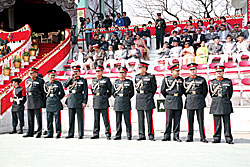 MIN RATNA BAJRACHARYA |
As far back as 2000, the Maoists had concluded that the way to victory was a fusion between insurgency and an armed urban uprising. Maoist chairman Pushpa Kamal Dahal had concluded that the army could only be defeated if his party could divide up the generals. They had been working on it, and the result was the 19 April move to ask the army chief for clarification.
The timing, they think, is now right. The Maoists have brought in tens of thousands of cadres and PLA to the capital. Many are from UNMIN monitored cantonments, even though under the peace accord that is not allowed. Security sources say they have information that the Maoists have also brought weapons stashes that were never locked up in UNMIN containers. Internally, the party has told the cadre to be prepared for a "final battle".
The Maoists have stepped back from decisions before, and they may conclude again that the international and domestic conditions are not right to do so. But the very fact that they haven't bothered to hide the preparation means they want to use the mass mobilisation in the capital itself as a deterrent against anyone who dares oppose them.
Until late Thursday, the Maoist secretariat was deep in meetings and leaders were tight-lipped. Their conclusion seems to be that the only obstacle to total state capture now is the integration of 19,000 PLA into the Nepal Army. Army Chief Katawal was the only remaining obstacle, which is why they have sought to remove him at the present time.
UML leader KP Oli has been warning about Maoist totalitarian motives for more than two years. He says: "The action against Katawal was the excuse they needed to control the army and implement their strategy to capture complete state power." Oli cites the three reasons on which the Maoists sought clarification from the army chief are all legally spurious.
Finance Minister Baburam Bhattarai, for his part, has been uncharacteristically tough, and says Katawal defied a government order and should be prosecuted to maintain the civil supremacy. He and Defence Minister Ram Bahadur Thapa Badal have been taking the hardline while Prime Minister Dahal fields pressure from other parties as well as the international community, especially India.
"There is no question of the government surrendering to any foreign pressure," Bhattarai has said.The Indian establishment, reacting to the strong pressure from the Indian military, has directly intervened to put pressure on the Maoists to leave the army alone. Indian ambassador Rakesh Sood has met Dahal three times this week and strongly urged a consensus among political parties.
The NC has been protesting the move, but has also been talking to the Maoists and the UML about a "wholesale deal" under a package that would include defusing the army row and bringing the NC into government. UML leader Madhab Kumar Nepal has tried to mediate not just between parties, but also between factions within his own party for and against the Maoist move against the army.
Nepal himself belongs to the side that wants the Maoists to back off. He says: "During the war, Pushpa Kamal Dahal was the leader of a party fighting the army, now he is the leader of two armies. Meddling in the army now could have grave consequences."
Meanwhile, the debate has strengthened the constitutional role of President Ram Baran Yadav, as supreme commander of the army. He has remained within his remit to send a memo to the prime minister warning him not to take any action against the army chief as it would break the institutional structure and chain of command and might affect the peace process and constitution writing. When a pro-establishment civil society delegation tried to put pressure on him this week, he bluntly told them he wasn't a "ceremonial" president but a "constitutional" one.
It now looks like the geopolitical situation and domestic opposition to the move to sack the army chief has made the situation untenable for the Maoists. They can either try to go ahead with it and stage a massive show of force on May Day, or they can back down. Either way, the Maoists will not have dropped their plan to capture state power, they will only be waiting for the opportune moment.
Many are now convinced that the Maoists are just not ideologically prepared to share power with anyone, and that they aren't really serious about the peace process and the constitution writing process over which they have no control.


